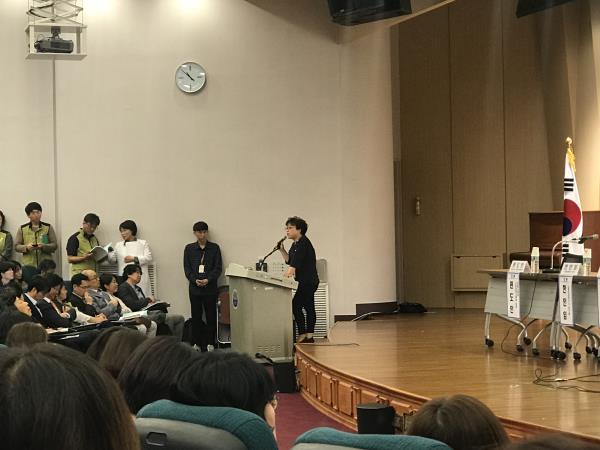Nurses raised their voices at a National Assembly debate that their working conditions worsened especially after the recently enforced law reduced work hours of trainee doctors.
After the so-called Medical Resident Act took effect to limit the maximum working hours of interns and medical residents at 80 hours a week, nurses had to do doctors’ leftover work, they complained. Nurses with three to five years of experience were picked by physicians to become physician assistants (PAs), making the other nurses stretched too thin, they said.
Reps. Jung Choun-sook of the ruling Democratic Party, Yoon Jong-pil of the main opposition Liberty Korea Party, Yoon So-ha of the minor opposition Justice Party, the Korean Nurses Association (KNA), and Korean Health & Medical workers' Union held the debate on the reality of Korean nurses’ labor and challenges on Monday.
At the debate, a nurse with 20 years of experience at a tertiary hospital said the lack of physicians negatively affected the working environment of nurses.

“If a medical error occurs, we divide doctors’ job from nurses’ work. However, in reality, we cannot do nurses’ job only,” the nurse said. “We even take care of physicians’ treatment orders for patients.”
“A doctor with only one or two years of experience expects seasoned nurses to make corrections in their treatment orders. If the orders go unfixed, doctors say the nurse is incompetent,” she said, adding that physicians regard such practice as usual.
Nurses also have to do pharmacists’ job, she added.
“Nurses give medication guidance for anticancer drugs and immunosuppressant agents, which patients take after discharge. We sometimes grind pills for patients who can’t swallow them,” she said.
The nurse also criticized the government’s push for “comprehensive nursing service,” which aims to combine work of nurses with that of caregivers within a ward.
“To provide such service, the service should be applied to all of the wards. If not, the system will generate conflicts among nurses,” she said. The nurse said her hospital had two wards and the one with the integrated service does not receive seriously ill patients because it should not have a guardian, which made the other ward have more seriously ill patients.
If the government still wants to introduce the comprehensive nursing service, the state has to manage all the hospitals, she argued.
“That way, nurses will not move their workplace from one to another. These days, new nurses learn skills at first but leave the hospital later to become public officials, pharmacists, or nurse specialists,” she said.
Other experts made several suggestions to improve the labor environment for nurses.
Park Young-woo, president of the Hospital Nurses Association, emphasized the establishment of “the standard wage guideline.”
“One of the main reasons that nurses’ leaving the hospital is low wages and poor benefits. The minimum wage and the maximum wage gap among nurses are increasing over time,” she said. “Another problem is that nurses’ wages at medical institutions are lower than other institutions where they can find jobs.”
According to Park, the gap between the maximum and minimum salaries of new nurses at hospitals has been increasing from 21.92 million won ($18,508) in 2011 to 26.3 million won in 2017.
The average salary gap between those working at a hospital and others at a non-medical institution has also been growing from 3.77 million won in 2011 to 4.25 million won in 2016.
Park Jin-sik, vice commissioner of policy affairs at Korean Hospital Association, said it was essential to provide an excellent education for new nurses.
“Through education for new nurses, a hospital should give them some room before they start working to deal with patients. We also need a policy and payment system so that the hospital can have reserve nurses for the balance of family and work,” he said.
Park went on to say that the authorities should be able to force violent patients who physically or verbally attack nurses to leave the hospital, adding that social protection for medical institutions should be enhanced.
Sohn Ho-joon, head of the medical resources policy at the Ministry of Health and Welfare, said he would do his best to enforce “the Healthcare Personnel Support Act.”
“The issue of nurses’ work condition is difficult to deal with because it is related to all the other issues such as labor force, patient safety, and taxpayers’ money. With the healthcare personnel support act, we will be able to address the issue,” Sohn said. “To enforce the law, we are preparing to make the sub-statute. To make the law effective, the sub-statute is to include wards, medical workforce, and delivery system.”

